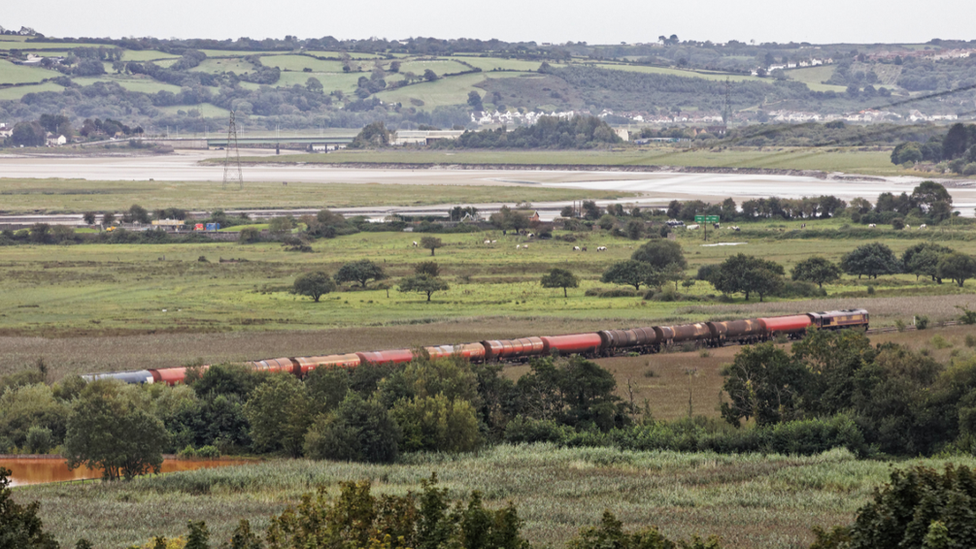Llangennech oil spill: No prosecution decision 'devastates' fishermen
- Published
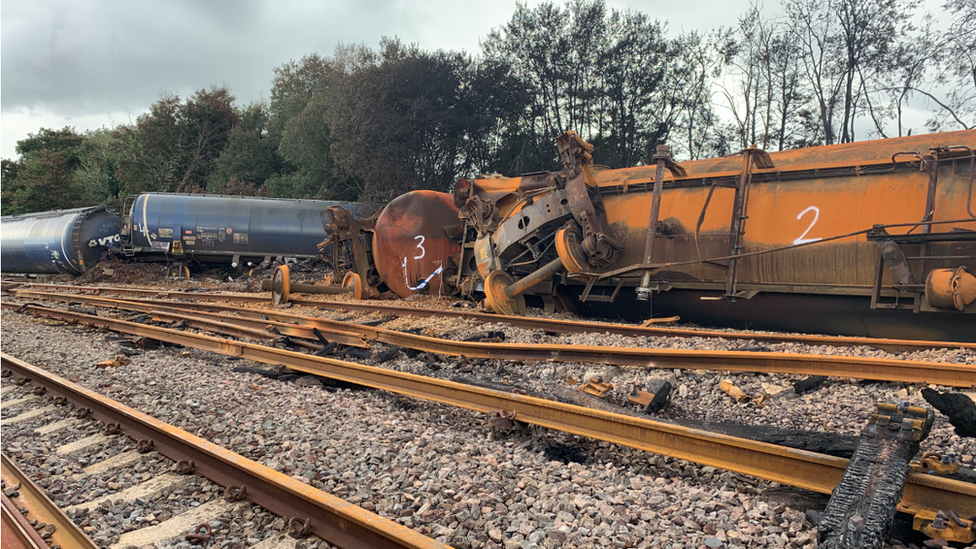
Ten wagons derailed, carrying up to 75.5 tonnes of fuel each
A decision not to pursue a prosecution for a major diesel spill has been described as "devastating" for the fishermen who lost work as a result.
Ashley Jones, of Selwyn's seafood, said cockle pickers lost as much as £15,000 of income after the Llangennech rail wagon derailment in August 2020.
Ten wagons derailed and hundreds of tonnes of diesel spilled into the Loughor Estuary in Carmarthenshire.
Natural Resources Wales said there was insufficient evidence for a conviction.
"It would be a reckless use of public monies to pursue a prosecution," the environmental body said.
The train was pulling the wagons from Milford Haven, Pembrokeshire, to Theale, near Reading, on 26 August 2020.
Cockle and shell fisheries in the area were closed for eight weeks after the spill, so that the shellfish could be tested for contamination.
Mr Jones, who owns of Selwyn's seafoods, explained that the closure took place in "peak season for cockle gathering," resulting in pickers losing up to £15,000, around a third of their annual income.
He said that some of the fishermen had to borrow money from Selwyn's, and others didn't return to the industry.
In order to keep up with customer demand, Selwyn's had to import cockles from other areas, Mr Jones said, which "came at a cost" to the business.
He said that the decision by Natural Resources Wales not to pursue a prosecution was "devastating for the fishermen."
The cocklers are looking into legal action of their own, but Mr Jones said it would likely cost a lot with little result, and he doubted the fishermen or the company would be able to afford to go any further.
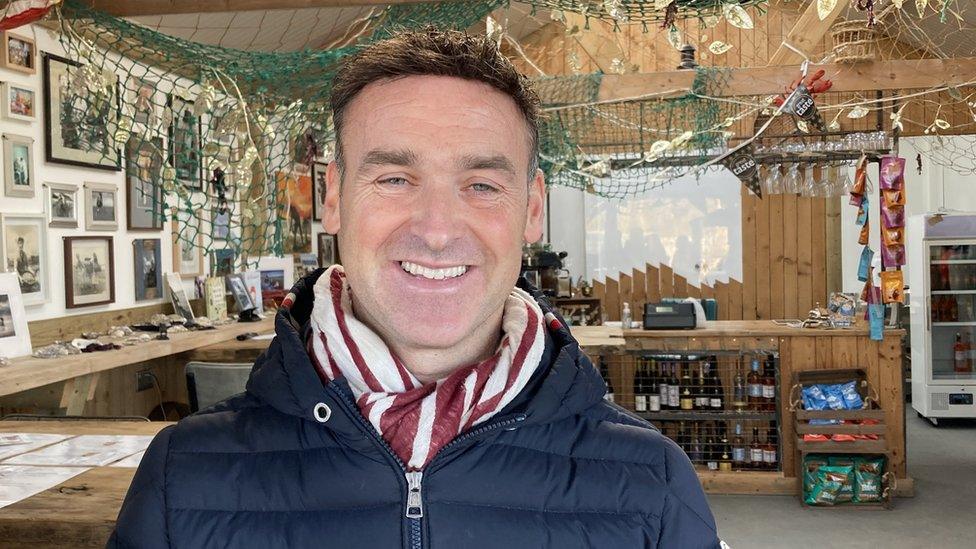
Ashley Jones said the closure of shell fisheries took place in peak season for cockle gathering
He said cocklers felt let down by Welsh Government, who provided grants when fisheries had to close, which cocklers now feared they'd have to pay back.
The Rail Accident Investigation Branch (RAIB) published a report one year ago concluding that in all probabilities a defective brake caused the derailment.
The resulting fire raged for more than 30 hours and 300 local people were evacuated from their homes. Neither the residents or the two train crew members were injured.
The investigation was then handed over to Natural Resources Wales who have the power to prosecute for environmental damage.
But Martyn Evans, Head of SW Operations at Natural Resources Wales, said the body was "bitterly disappointed" it was not in a position to launch a prosecution despite the cause of the event being "reasonably clear."
"While there is strong evidence identifying the likely cause of the derailment and the impact that had on the environment, it has not been possible to determine beyond reasonable doubt who was ultimately responsible for the derailment of the train wagon," he said.
"This has been a difficult and disappointing decision for Natural Resources Wales to make. The impact of this incident will be felt in the environment for years to come."
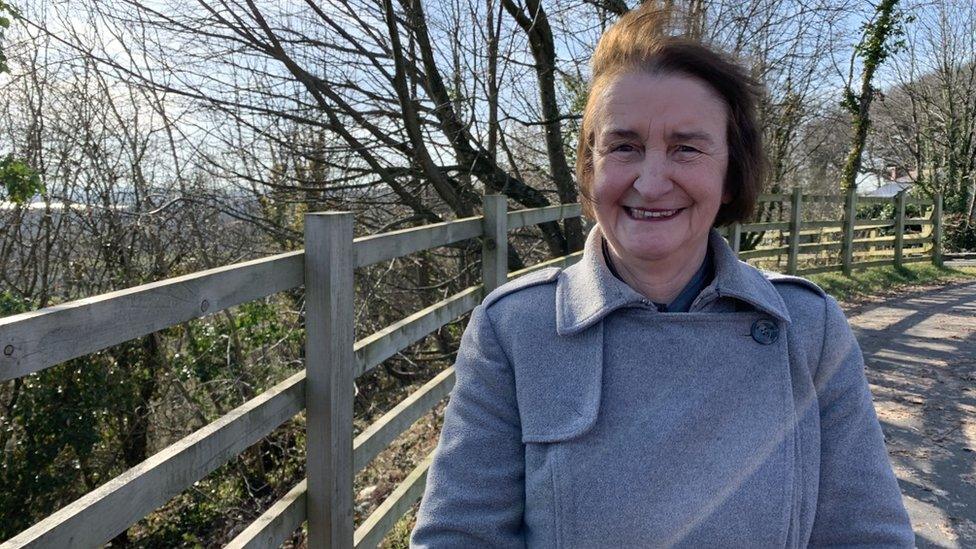
Nia Griffith said the lack of accountability was disappointing
Nia Griffith, MP for Llanelli, said the lack of accountability was "hugely disappointing for the cocklers."
Describing Natural Resources Wales' decision as "really disappointing," she expressed her concern that, three years before the 2020 derailment, an RAIB report into another incident suggested "maintenance was the issue."
In that incident, 45 miles (72 km) of track between Carmarthen Junction and Llangyfelach Tunnel was damaged.
Comparing the two events, Nia Griffith asked: "how many times can companies get away with this, causing massive amounts of damage, a lot of expense to the public purse, and still no one is prosecuted?"
She called on the UK Government to hold public bodies to account for the issues listed in the RAIB reports.
The UK government said it could not comment on matters relating to prosecution or liability.
The Welsh government said it joined the NRW in being disappointed there would be no criminal prosecution.
A spokesperson said: "However, the extensive recovery operation that took place following the incident helped to avoid further environmental damage and limit long-term damage. As would be expected those involved in the incident covered the costs of the recovery operation ensuring the polluter paid for the damage they had caused.
"A number of investigations have now taken place into the incident and it is vital that lessons are learned from these to avoid anything like this happening again."
The government added that it had agreed to guarantee loans up to the value of £200k to prevent "financial hardship" for the cockle gatherers affected, and that they'd "consider the implications" of NRW's decision.

WILD MOUNTAINS OF SNOWDONIA: Five farming families open their gates and share their lives
IOLO: A WILD LIFE: Iolo delves into the archives from the past 25 years

Related topics
- Published13 January 2022
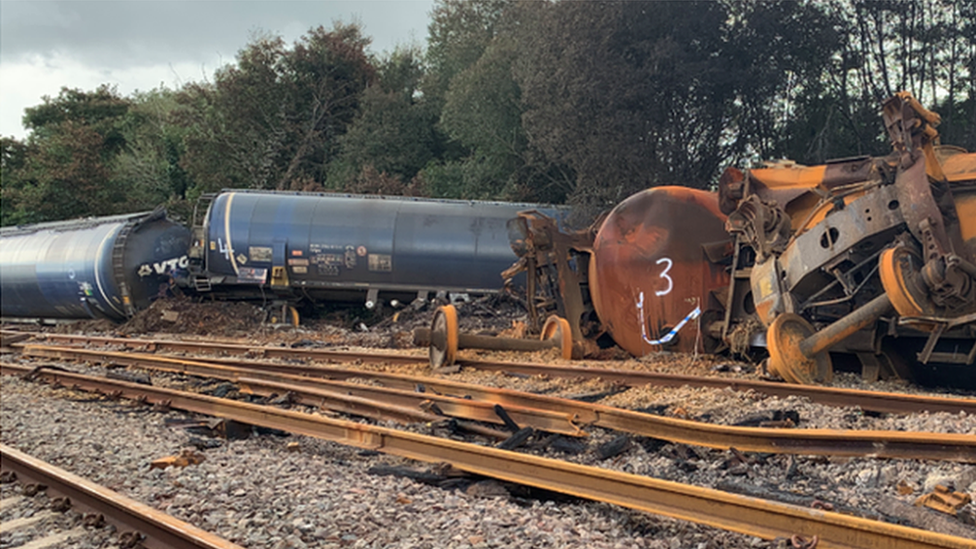
- Published1 February 2021

- Published13 October 2020
